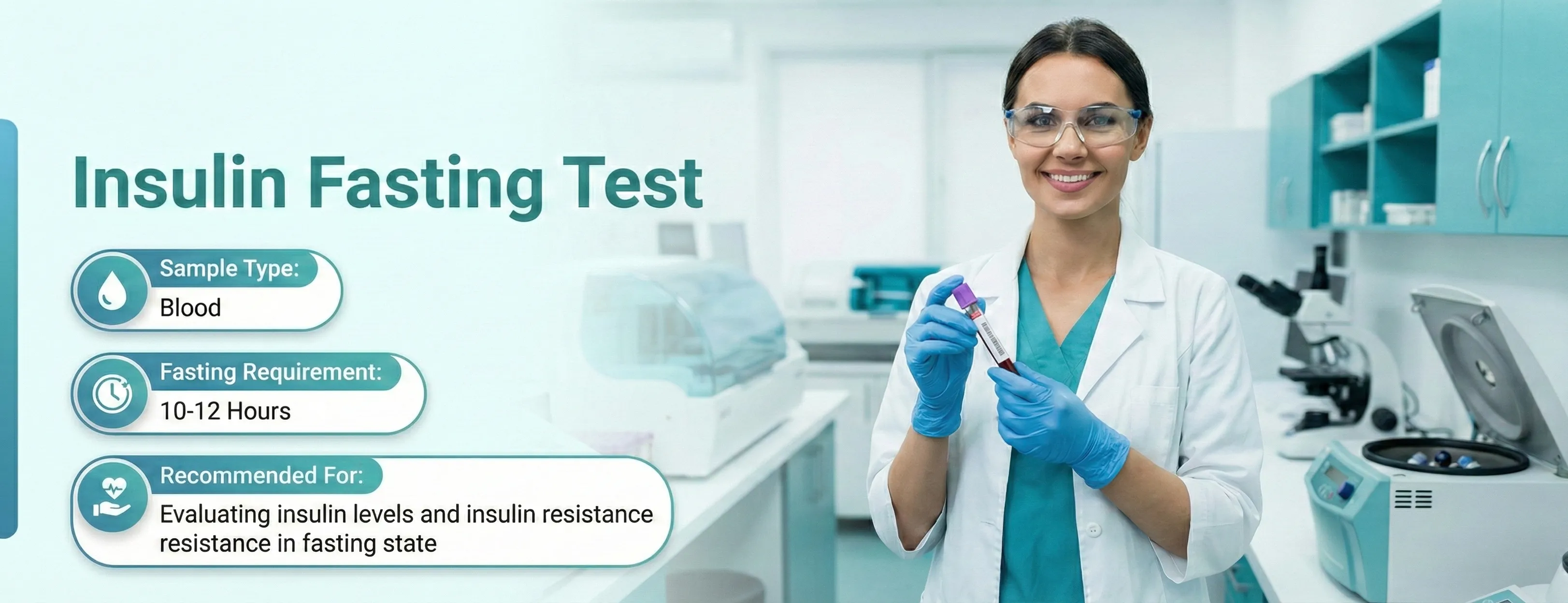646+ orders placed in your location
100% NABL & ISO Certified Lab • 100% Accurate Reports
Insulin Fasting Test
Fasting Insulin, Serum Insulin, Insulin F
- SummaryThe Insulin Fasting test measures the level of insulin in the blood after an overnight fast and helps assess the health of pancreas, insulin resistance, hypoglycemia, or diabetes risk. It is done using a blood sample, and fasting for 8–10 hours is required before the test.Read more
- Reports Within17 HrsView Sample Report100% NABL & ISO Certified Labs
- SampleBlood
- AgeAll Age Group
- GenderMale and Female
- Fasting10-12 Hrs
PharmEasy Promises
Know More About The Test
A quick info on insulin Fasting
Overview
The Blood Group Test is performed to learn about the type of blood group a person has.
The Blood Group Test becomes very important when a person either wants to donate blood to somebody or wants to receive blood from someone. (This is called ‘blood transfusion.’)
Doctors first determine the donor’s blood group before using their blood for a transfusion to another person. This is important because if the donor’s blood is not compatible with the receiver’s blood group, then there can be many serious complications for the receiver.
The kinds of antigens present on the surface of blood cells help determine the blood group. Antigens are entities that help in differentiating between the body’s own cells and foreign cells. These can have dangerous effects on your body as, when the antigens identify any cell as foreign, they go on to destroy it.
Based on the kinds of antigens present in blood cells, there are four major blood groups:
- Type A, which has the A antigen.
- Type B, which has the B antigen.
- Type AB, which has both A and B antigens.
- Type O, which has neither A antigen nor B antigen.
- Rh positive has Rh antigen
- Rh negative does not have Rh antigen
Ideally, someone with Type A blood group should only receive blood from someone else with the same blood group after making sure that their blood groups match with the help of a Blood Group Test.
However, some blood groups can also receive blood from other blood groups. This happens as, in these cases, the antigens don’t view the other blood cells as foreign elements that can cause danger.
Thus, the Blood Group Test is used to know the blood group of a patient, donor, receiver of blood transfusion
In India, there can be a shortage of the matching blood type for transfusion, especially in remote areas. Sometimes, people also face complications because of receiving an incompatible blood group.
To avoid and overcome these incidents, it is better to have your and your family’s blood group test done beforehand and know your blood group. This will be helpful in both donating and receiving blood.
Sample Type
The insulin fasting test is done by taking a blood sample. This blood sample for the insulin fasting test is drawn after 8-12 hours of fasting. This means the person giving the sample should not have any food or beverages except water for around 10 hours before the blood draw. This test is often accompanied by the Blood Sugar Fasting Test, Urine Sugar test, HBA1c for diabetes, and sometimes, the Lipid Profile Test.
Risk Assessment
Hypoglycaemia, Type 1 Diabetes, Type 2 Diabetes, Pancreatic tumours such as Insulinoma, Insulin resistance
What does this test detect?
A fasting insulin test measures the level of insulin in the blood. This measurement is done by analysing the blood sample. The person is asked to fast before the test to determine the production of insulin from the resting state of the pancreas. This fasting ensures there is no immediate requirement from the pancreas to produce large quantities of insulin. This baseline insulin is what the fasting insulin test measures.
The measurement enables this fasting insulin test to detect insulinomas as well. Insulinoma is a pancreatic tumour. In the case of such a tumour, the pancreas produces insulin far more than the standard quantity.
Indications for Insulin Fasting Test
The fasting insulin test is prescribed for all genders and age groups equally. One can expect to be prescribed a fasting insulin test in case of the following parameters:
- Family history of diabetes.
- Pregnancy while already suffering from Type 1 or Type 2 diabetes.
- Pregnancy with diabetes - gestational diabetes.
- Obesity or being overweight.
- Sedentary lifestyle or less active physically.
- History of high blood sugar levels posts meals.
These are all parameters that increase the risk of developing diabetes in a person.
In such cases, a fasting insulin test may be prescribed as a general check-up.
Other conditions for which fasting insulin test is prescribed are:
- Known case of Type 1 diabetes.
- Known case of Type 2 Diabetes.
- A diabetic person not responding to oral medication.
- Uncontrolled blood sugar levels.
- Gestational diabetes.
- Frequent hypoglycemic episodes
Some symptoms, if reported by a person, may warrant a prescription of an insulin fasting test from the doctor:
- Abnormally high blood sugar levels.
- Abnormal sweating, increased urination, increased thirst, increased appetite levels, Blurring of vision, palpitations.
- A previous report marks a person at risk of diabetes, i.e. Prediabetes.
- Occasional dizziness, fainting spells.
- Unexplained lethargy, weakness.
- Dry mouth or excessive thirst.
How frequently should you take this test?
The insulin fasting test is repeated based on these parameters -
- If a person has type 1 or type 2 diabetes.
- The overall blood sugar or diabetes control with or without medicine.
- Some particular medicines prescribed for diabetes require repeated and scheduled testing of insulin fasting.
The frequency of repetition for each of these conditions is as follows:
- For the person who has type 2 diabetes, repeat the insulin fasting test once every 3-6 months.
- An insulin fasting test is prescribed every year for monitoring purposes for those who are borderline in other reports or Prediabetes.
- For patients who are already on medication for diabetes but the blood sugars are not under control, an Insulin fasting test is done to determine insulin resistance. The test may be repeated once after the insulin supplementation has begun. Repeat the test 1 month after starting the new medication.
Test Preparation
Before the Test
Before undergoing the insulin fasting test, it is important to fast for 8-12 hours beforehand. This fasting period is crucial for achieving accurate test results. Therefore, it is wise to seek advice from a doctor before taking any test to determine if there are any specific restrictions in place.
During the Test
A phlebotomist will draw blood from a vein in your arm for the sample. Your experience will likely involve:
- Disinfecting the site where the needle will be inserted with an antiseptic.
- Wrapping a tourniquet around your arm to make the veins more visible.
- Inserting a disposable needle into the vein to collect the blood. This process may cause minor discomfort from the needle and could take a few seconds.
- Placing the sample in a small container or test tube labelled with your test information.
After the Test
After the Blood is Collected:
- Applying a bandage to the site where the needle was inserted to prevent any bleeding.
- You may feel slightly sore or lightheaded, which is normal and nothing to be concerned about. You may be advised to rest for a few minutes.
- Contact your doctor if you experience any bleeding, discomfort, or rashes at the puncture site.
Parameters
The Insulin Fasting test includes only a straightforward blood test. It checks for the insulin level in the blood after fasting for up to 12 hours. It measures the insulin produced by the pancreas and the amount present in the blood when there is no food to break down and convert into glucose for energy. This is the only parameter to test in the fasting insulin test.
Although, for complete diagnosis, the doctor may prescribe some other tests to be done along with this test.
Ranges
The normal range of insulin reported in an insulin fasting test is in the range of 2.6 - 37.6 μIU/ml.
Insulin is sometimes observed below 2.6 μIU/ml.
But, if an insulin fasting test report is greater than 37.6 μIU/ml, it is a high result.
Insulin Level (μIU/ml) | What It Indicates |
Between 2.6 - 37.6 μIU/ml | Normal range |
Below 2.6 μIU/ml | Low. A possible sign of diabetes. |
Above 37.6 μIU/ml | High. Needs to be correlated with other reports, especially blood sugar fasting reports. |
The normal values and reference ranges of the test may vary from lab to lab. Please refer to the ranges mentioned in the report and consult a doctor to understand the interpretation of lab reports.
Test Result Interpretation
The results of the insulin fasting test can not be interpreted as a standalone result, except in the case where they are abnormally high and point towards the possibility of an insulinoma.
The insulin fasting test is used as a confirmatory test for diabetes. Therefore, the results should be compared or interpreted along with the blood sugar fasting test and other tests for diabetes.
Fasting insulin level | Fasting blood sugar level | Possible Condition |
High | Normal | Insulin Resistance (type 2 diabetes) |
Low | High | Diabetes due to insufficient insulin production |
High | Low | Low blood sugar or hypoglycaemia due to increased insulin production than necessary. |
Risks and Limitations
The insulin fasting test test is a commonly done blood test with rare risks of complications. See your doctor if you notice:
- Persistent bleeding at the site of needle-insertion.
- The skin where the needle went in becomes red, swollen, or hurts.
Limitation of the test
- The accuracy of the test could be affected due to equipment or human mistakes.
- Misinterpretation of the markers leading to inaccurate report.
Was This Test Information Helpful?
Please rate your experience
References
Health packages containing 'Insulin Fasting Test'
People Also Ask
What is a normal fasting insulin level?
Why is a fasting insulin test done?
What does fasting insulin tell you?
Can you have high insulin and not be diabetic?
Can I drink water before the fasting insulin test?
Have any doubts? Ask us.
Ask us anything about the Insulin Fasting Test to understand it better
Explore More at PharmEasy
Top-Selling Healthcare Products
Top-Searched Medicines
We provide trusted, expert-curated health content to support better awareness,prevention, and care.
Backed by experienced doctors, medical experts, and strict editorial standards.

